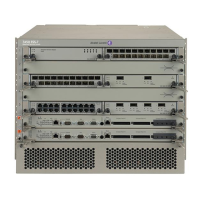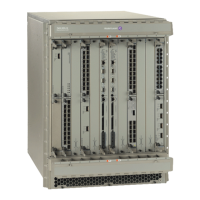Network QoS Policies
Quality of Service Guide 121
Parameters lsp-exp-value — Specify the LSP EXP values to be associated with the forwarding class.
Default None, the lsp-exp command must define a value.
Values 0 to 8 (Decimal representation of three EXP bit field)
fc fc-name — Enter this required parameter to specify the fc-name that the EXP bit pattern will be
associated with.
Default None, the lsp-exp command must define a fc-name.
Values be, l2, af, l1, h2, ef, h1, nc
profile {in | out} — Enter this required parameter to indicate whether the LSP EXP value is the
in-profile or out-of-profile value.
Default None, the lsp-exp command must define a profile state.
Values in, out
Network Egress QoS Policy Commands
egress
Syntax egress
Context config>qos>network
Description This command is used to enter the CLI node that creates or edits egress policy entries that specify the
forwarding class queues to be instantiated when this policy is applied to the network port.
The forwarding class and profile state mapping to in and out-of-profile DiffServ code points and
MPLS EXP bits mapping for all labeled packets are also defined in this context.
All service packets are aggregated into DiffServ based egress queues on the network interface. The
service packets are transported either with IP GRE encapsulation or over a MPLS LSP. The exception
is with the IES service. In this case, the actual customer IP header has the DSCP field mapped.
All out-of-profile service packets are marked with the corresponding out-of-profile DSCP or the EXP
bit value at network egress. All the in-profile service ingress packets are marked with the
corresponding in-profile DSCP or EXP bit value based on the forwarding class they belong.
fc
Syntax [no] fc fc-name
Context config>qos>network>egress
